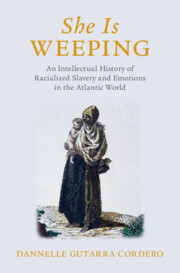11 results
1 - The Emotional Foundations of Racialized Slavery
-
- Book:
- She Is Weeping
- Published online:
- 03 November 2021
- Print publication:
- 18 November 2021, pp 1-48
-
- Chapter
-
- You have access
- HTML
- Export citation
3 - Atlantic Slavery and Its Passionate Transgressions
-
- Book:
- She Is Weeping
- Published online:
- 03 November 2021
- Print publication:
- 18 November 2021, pp 112-167
-
- Chapter
- Export citation
Contents
-
- Book:
- She Is Weeping
- Published online:
- 03 November 2021
- Print publication:
- 18 November 2021, pp v-vi
-
- Chapter
- Export citation
2 - Scientific Racism and Emotional Difference
-
- Book:
- She Is Weeping
- Published online:
- 03 November 2021
- Print publication:
- 18 November 2021, pp 49-111
-
- Chapter
- Export citation
Acknowledgments
-
- Book:
- She Is Weeping
- Published online:
- 03 November 2021
- Print publication:
- 18 November 2021, pp vii-viii
-
- Chapter
- Export citation
Bibliography
-
- Book:
- She Is Weeping
- Published online:
- 03 November 2021
- Print publication:
- 18 November 2021, pp 259-276
-
- Chapter
- Export citation
4 - The “Abolition” of an Economic Apparatus of Feelings
-
- Book:
- She Is Weeping
- Published online:
- 03 November 2021
- Print publication:
- 18 November 2021, pp 168-223
-
- Chapter
- Export citation
Copyright page
-
- Book:
- She Is Weeping
- Published online:
- 03 November 2021
- Print publication:
- 18 November 2021, pp iv-iv
-
- Chapter
- Export citation
5 - The Racialization of Emotions in Contemporary Slavery
-
- Book:
- She Is Weeping
- Published online:
- 03 November 2021
- Print publication:
- 18 November 2021, pp 224-258
-
- Chapter
- Export citation
Index
-
- Book:
- She Is Weeping
- Published online:
- 03 November 2021
- Print publication:
- 18 November 2021, pp 277-282
-
- Chapter
- Export citation

She Is Weeping
- An Intellectual History of Racialized Slavery and Emotions in the Atlantic World
-
- Published online:
- 03 November 2021
- Print publication:
- 18 November 2021



